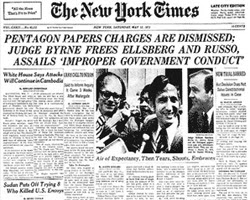
_(photo_by_Carl_van_Vechten).jpg) William Faulkner's
collection of short stories,
Go Down,
Moses, was published in book form on 11th
May 1942.
William Faulkner's
collection of short stories,
Go Down,
Moses, was published in book form on 11th
May 1942.
The Academy of
Motion Picture Arts and Sciences is founded on the 11th May 1927. Douglas Fairbanks is the
first president of the academy.
Citing government misconduct, Daniel Ellsberg has
charges for his involvement in releasing the Pentagon Papers to The New York
Times dismissed on 11th May
1973. Whilst Ellsberg is not strictly the author of the Pentagon Papers his
‘publication’ of the material was quite a performance. Indeed the dismissal of
the charges was a classic form of deus ex
machina in the shape of Richard Nixon, President of Paranoia.
As a
response to the leaks, the Nixon administration began a campaign against
further leaks and against Ellsberg personally. Aides Egil Krogh and David Young,
under the supervision of John
Ehrlichman, created the "White House
Plumbers", which would later lead to the Watergate
burglaries.
In August 1971, Krogh and
Young met with G. Gordon
Liddy and E. Howard
Hunt in a basement office in the Old Executive
Office Building. Hunt and Liddy recommended a "covert
operation" to get a "mother lode" of information about
Ellsberg's mental state in order to discredit him. Krogh and Young sent a memo
to Ehrlichman seeking his approval for a "covert operation [to] be
undertaken to examine all of the medical files still held by Ellsberg’s
psychiatrist." Ehrlichman approved under the condition that it be
"done under your assurance that it is not traceable."
On 3rd September
1971, the burglary of Lewis
Fielding's office – titled "Hunt/Liddy Special Project No.
1" in Ehrlichman's notes — was carried out by Hunt, Liddy and CIA
officers Eugenio
Martinez, Felipe de
Diego and Bernard
Barker. The "Plumbers" failed to find Ellsberg's file.
Hunt and Liddy subsequently planned to break into Fielding's home, but
Ehrlichman did not approve the second burglary. The break-in was not known to
Ellsberg or to the public until it came to light during Ellsberg and Russo's
trial in April 1973.
On 26th April 1973 the break-in of Fielding's office was
revealed to the court in a memo to Judge Byrne, who then ordered it to be
shared with the defence.
On 9th
May 1973 further evidence of illegal wiretapping against Ellsberg was revealed
in court. The FBI had recorded numerous conversations between Morton Halperin
and Ellsberg without a court order, and furthermore the prosecution had failed to
share this evidence with the defence. During the trial, Byrne also revealed
that he personally met twice with John Ehrlichman, who offered him directorship
of the FBI. Byrne said he refused to consider the offer while the Ellsberg case
was pending, though he was criticized for even agreeing to meet with Ehrlichman
during the case.
Due to the gross governmental misconduct
and illegal evidence gathering, and the defence by Leonard Boudin and Harvard Law School
professor Charles
Nesson, Judge Byrne dismissed all charges against Ellsberg and Russo
on 11th May 1973 after the government
claimed it had lost records of wiretapping against Ellsberg. Byrne ruled:
"The totality of the circumstances of this case which I have only briefly
sketched offend a sense of justice. The bizarre events have incurably infected
the prosecution of this case."

No comments:
Post a Comment